Muzzles are often associated with dangerous and aggressive dogs, but they can also be helpful for the sweetest pups in the world.
In fact, muzzles help to keep you and your pooch safer, and they can also play an important role in the training of your pooch.
There are a lot of great commercial muzzles on the market, but if you’re looking to construct your own or can’t find a commercial one that suits your pooch, there are a couple of superb DIY project plans to get you started.
Just remember that because muzzles often serve as a safety tools, it’s important that these projects are executed with care to keep you and your doggo safe.
Below, we’ll dive into a couple of the best DIY muzzle options around! We’ll also discuss some of the reasons why you may want to use a muzzle and clear the air surrounding some common muzzle misconceptions.
Six Great DIY Muzzles
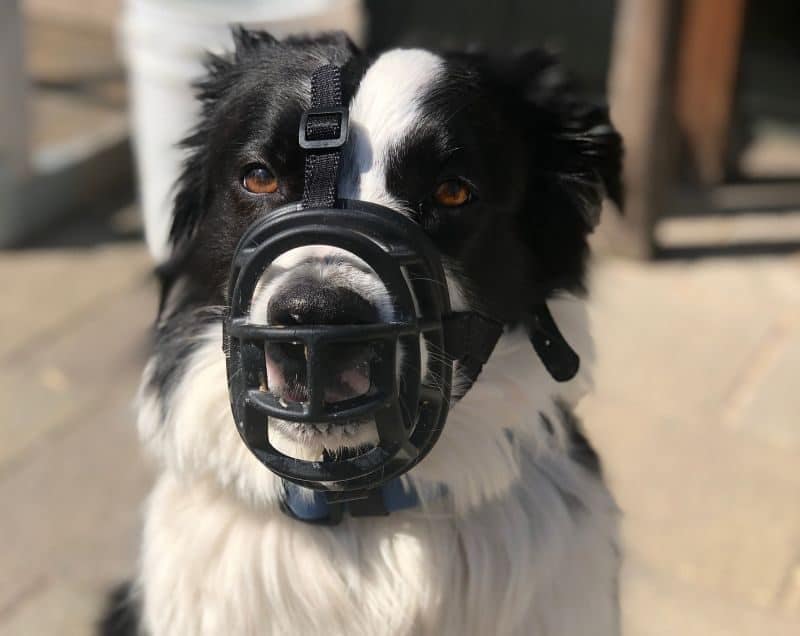
Here are some of our favorite muzzles you can make from the comfort of your own home.
SAFETY NOTE: To prevent your canine from overheating, always make sure that his muzzle doesn’t impede his ability to open his mouth and pant normally. This is especially important during warm weather walks.
1. Long-Lasting Muzzle from Dogsaholic
If you’re looking to create a muzzle you can use day in and day out, the long-lasting muzzle from Dogsaholic is an excellent choice.
This muzzle requires some sewing ability to complete, but you’ll only need a few materials to make it. Just be sure to print out the detailed instructions for the sewing patterns.
Difficulty Level: Moderate
Materials Needed:
- Nylon Webbing
- Thread
- Plastic Cargo Buckle
Tools Needed:
- Sewing Machine
- Scissors
2. Environmentally Friendly Muzzle from Instructables
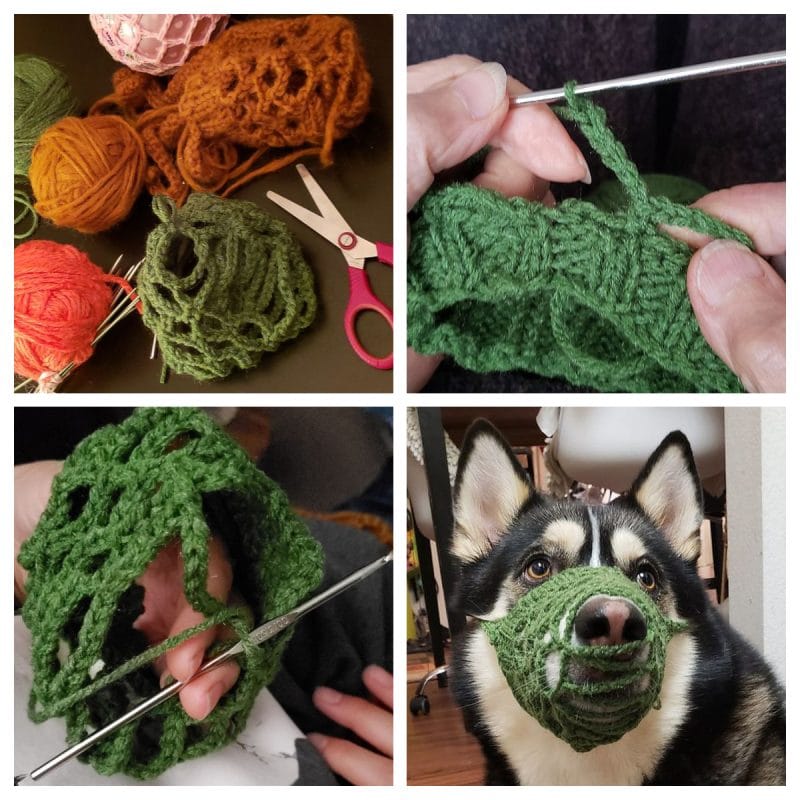
Instructables offers a crochet muzzle project which is just as cute as it is functional!
This probably isn’t the strongest muzzle around, so it may not be a good choice for nippy dogs who are big or strong. Instead, this muzzle would work best to prevent your pooch from eating things he finds on the ground during walks.
However, you could also experiment with other, stronger materials if you like.
Difficulty Level: Moderate to Difficult
Materials Needed:
- Buckle
- Cotton Thread
Tools Needed:
- Crochet Hook
If you’re new to crocheting, check out this video which outlines most of the techniques you’ll need to master when making this muzzle.
3. DIY Coke Bottle Muzzle by Rabiul Hassan
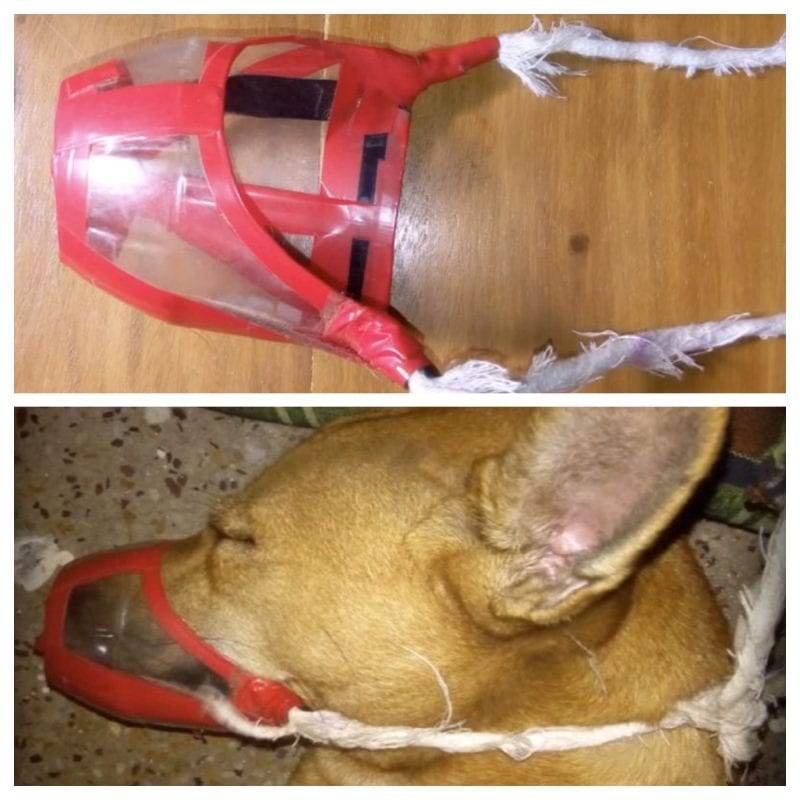
YouTuber Rabiul Hasan offers an easy muzzle solution that can be made by anyone who has an empty soda bottle laying around the house.
Essentially, you’ll cut the top off the bottle to make room for your pup’s snout, you’ll use electrical tape to cover any rough or sharp edges, and then you’ll tether it to your pooch with gauze.
Soda bottle muzzles, although convenient, should be limited to short-term use, as they’ll limit your dog’s ability to pant effectively. Instead of using them during walks, it would be wiser to use them during grooming or nail-trimming sessions.
This project is best-suited for smaller breeds, as snout size is limited to the size of your soda bottle.
Difficulty Level: Easy
Materials Needed:
- Large Soda Bottle
- Electrical Tape
- Gauze
Tools Needed:
- Scissors
- Ruler
- Pen/Marker
4. Decorative Duct Tape Muzzle by The Dog Geek
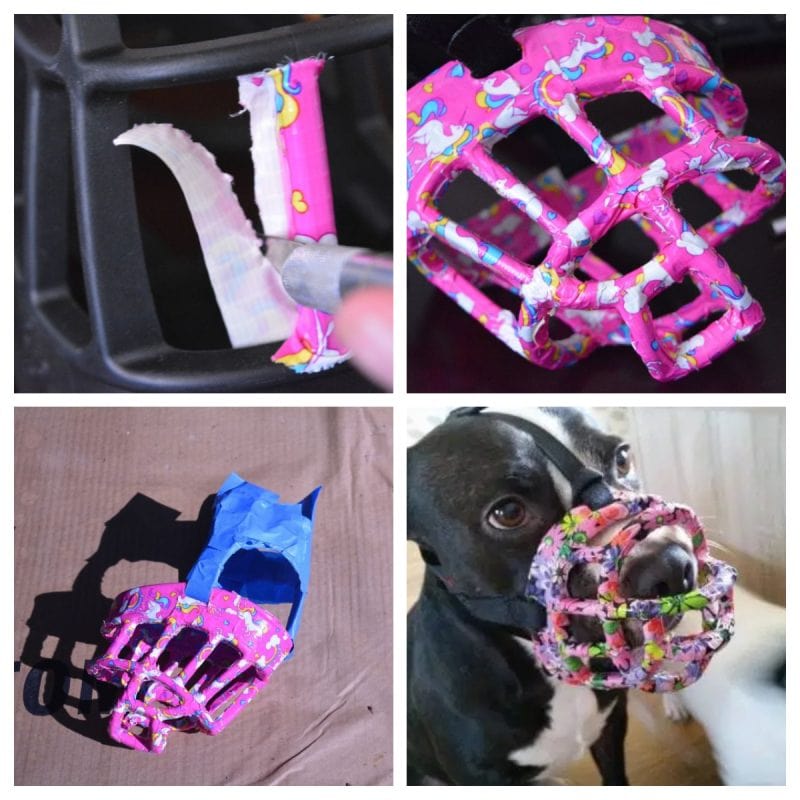
Thedoggeek.com offers a great way to help reduce the stigma of muzzles and gives you the opportunity to personalize your muzzle to match your pup’s unique sense of style.
This DIY project does not explain how to create a muzzle itself; it describes the way in which you can dress up a preexisting muzzle with duct tape.
Not only is this project super cute, but bright or reflective duct tape can help your pup be more visible and safe.
Difficulty Level: Easy
Materials Needed:
- Duct Tape
- Clear Enamel Spray (Optional)
Tools Needed:
- Exacto Knife
Check out the video below to learn a few more advanced duct-tape decorating techniques. The tips in the video aren’t designed specifically for making a DIY muzzle, but they may help get your creative juices flowing.
5. Gauze Muzzle by Dogtime.com

Dogtime.com offers a great solution for owners who need a safe makeshift muzzle solution. This method is definitely not one you’d use on an everyday basis, but if you need an emergency muzzle, it works beautifully.
All you need for this muzzle is some gauze and scissors. Be sure to watch the handy tutorial to ensure that you’re securing the muzzle properly.
Difficulty Level: Easy
Materials Needed:
- Gauze
Tools Needed:
- Scissors (In an emergency, you could just tuck any excess gauze under the strap behind your dog’s head).
6. Do-It-Yourself Dog Muzzle by The Honest Kitchen
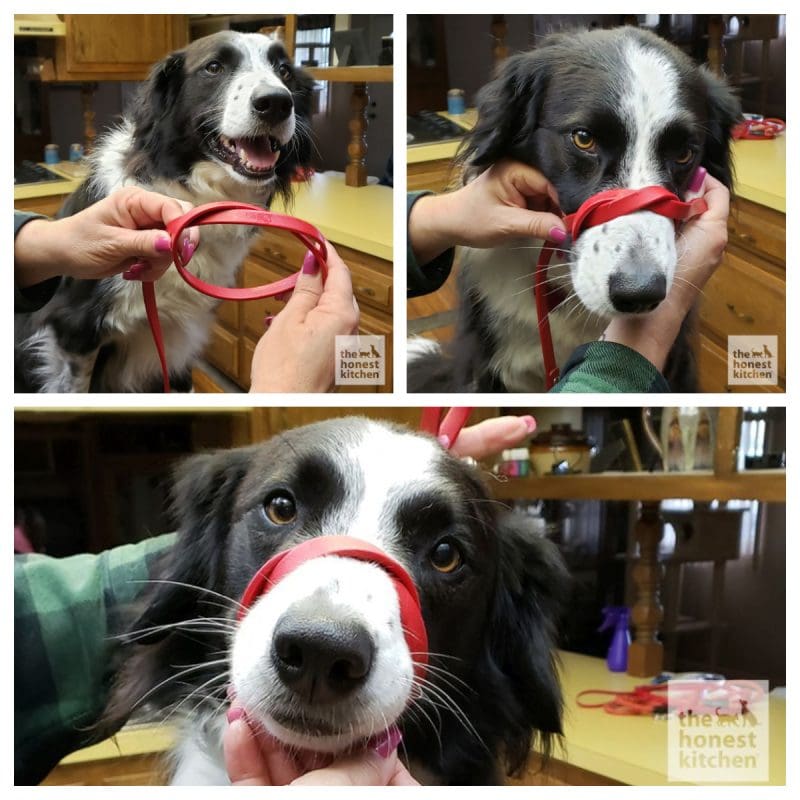
The Honest Kitchen offers another makeshift solution for a temporary muzzle.
This muzzle is created by tying a leash around the snout in a secure fashion. It should be noted that this method cannot be used on short-snouted pups, as their snout is not long enough to keep the leash in place.
This temporary muzzle is great for needing a restraint on the fly, but it should not be used on a regular basis.
Difficulty Level: Easy
Materials Needed:
- Leash
Tools Needed:
- None
Check out the video below to see a similar muzzle being put to use.
Are There Any Alternatives to Muzzles for Dogs?
Muzzles — especially basket muzzles — are widely used for one key reason: They work.
There aren’t many things that are simultaneously affordable, help to prevent biting and “foraging,” and allow dogs to pant, drink, and eat. However, there are a few things that you may be able to use as an emergency muzzle.
Head Halters
Though they’ll never be as secure as proper muzzles are, some owners have found that head halters (such as the PetSafe Gentle Leader) can work like a muzzle in a pinch.
Designed to provide owners with better canine control and address leash-pulling more effectively than a typical leash-and-collar setup, these tools essentially work by wrapping around your dog’s jaw and clipping to a leash. This allows you to direct your dog’s head in the direction you want to walk.
But if you tighten the muzzle portion, they can also kinda-sorta serve as a muzzle. Just remember that you don’t want to keep your dog’s mouth closed for very long (especially when he’s exercising or in hot weather).
These types of makeshift muzzles will work best for preventing your pet from eating things off the ground; they may not be secure enough to prevent a dog from biting.
E-Collars
If they’re pretty large, E-collars can accomplish some of the same tasks a muzzle does. They’re not going to prevent your pooch from biting people or other dogs, but they may prevent your dog from picking things up off the ground with his mouth.
And, of course, they’ll help prevent him from licking or biting wounds — their primary intended function.
Head Coverings
Head coverings, like the OutFox Field Guard, are essentially net-like bags that go over your dog’s entire head.
As with E-collars, they may help prevent your pet from eating things he’s not supposed to, but they’re not going to prevent dog bites. They probably aren’t going to stop your dog from biting wounds either.
The Benefits of Muzzles

Muzzles are helpful in a variety of ways. Their primary function is obviously to prevent your dog from biting anyone. But they provide a number of other benefits too!
Here are a couple of ways in which muzzles may benefit you and your pet:
Muzzles Are Helpful for Injury Recovery
Muzzles can be useful for preventing an injured dog from chewing on wounds that are still healing. This will often help eliminate the need to fit your dog with the dreaded E-collar.
Muzzles Help Prevent Dogs From Feasting on Street Snacks
Some dogs like to taste anything interesting-smelling that they encounter during walks.

But while this is pretty common, it is definitely something you’ll want to try to prevent.
Your pup could easily snatch something hazardous off of the street that could upset his stomach or even cause him to fall seriously ill.
But a muzzle will help prevent your pooch from snacking on potentially dangerous things.
Muzzles Are Helpful Management Tools
From time to time, your dog will likely have to endure things that may trigger him to lash out.
This includes everything from veterinary visits to grooming sessions.
But by fitting your dog with a muzzle, you can ensure that he won’t bite the hand that grooms him.
Muzzles Provide Additional Safety During New Experiences
If you’re just getting to know your pet and you’re not 100% sure how he’ll react to certain stimuli, a muzzle is a great idea.
It’s always better to be safe than sorry, and fitting your dog with a muzzle gives you an opportunity to learn more about your dog’s natural behavior and tendencies, without having to stress out about anyone’s safety.
Safe Use of a Muzzle for Dogs
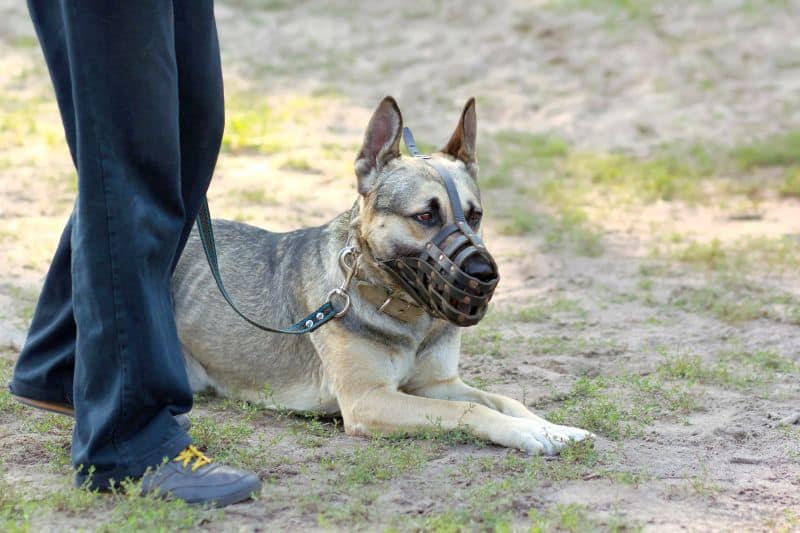
An improperly fitted muzzle can be dangerous, not to mention irritating for your dog. So, to prevent these problems, make sure you follow these helpful tips to keep your pup’s tail wagging.
Use a Muzzle Design Suitable for Your Dog
When using a muzzle, it’s important to keep your dog’s specific needs in mind.
For example, if your dog is a brachycephalic breed (short-snouted dogs such as pugs or chow-chows), you’ll want to pay close attention to your pooch, as he may have trouble breathing while wearing a muzzle.
Use the Proper Type of Muzzle for Your Needs
Some muzzles hold a dog’s mouth completely closed, which can make it harder for dogs to pant and cool down their body properly.
These types of muzzles should be used for very limited amounts of time or during emergencies. Don’t use these types of muzzles an everyday basis. Instead, opt for a basket-style muzzle for extended use.
Only Use Muzzles When You Can Supervise
As a general rule, muzzles should be used only when your pup is under supervision.
You never know how your pooch may react to a muzzle when you’re not there, so it’s always a good idea to keep a watchful eye on your pup when he wears one.
Keep Your Canine’s Comfort in Mind
Like anything you put on your pet, make sure the muzzle fits well, does not rub or dig into any skin, and rests comfortably on your pet’s snout.
Think about the material of the muzzle too, and consider whether or not it is appropriate for its planned use.
Start ‘Em Young! Teach Your Dog to Accept a Muzzle from an Early Age

Introducing your pup to muzzles early on is one of the best things you can do for his emotional and physical health. Plan to introduce your puppy to muzzles around the same time you start socializing him.
Being proactive about muzzle training sets your pup up to be fearless and friendly, even at the groomer or vet. Here are a few tips for teaching your doggo to accept muzzles.
1. Association
Before attempting to muzzle your pup directly, lay it on the ground and allow him to sniff and inspect it.
Using a soothing voice, give your pooch praise or small treats when he touches his nose to the muzzle. You can even try putting your pup’s treats or food inside or on the muzzle, while it is laying on the ground.
Repeat this process for a couple of days, or until your pet seems comfortable with the foreign object.
2. Hold the muzzle
After successfully creating a positive association, hold the muzzle in one hand and place a treat in the basket of the muzzle so that your dog must put his snout in the apparatus to get a treat.
Lather, rinse, and repeat until comfortable!
3. Putting on the muzzle
Slip the muzzle gently over the snout, but then remove it immediately and praise your pupper.
Work up to slipping on the unclipped muzzle and moving around the flaps slightly to familiarize your pooch with the process.
4. Phasing Out of Training
Practice putting on and taking off the muzzle fully. Try to increase the length of time you make your pup wear it until he gets totally comfortable and learns that there’s nothing to worry about.
Don’t forget to reward and praise during this step too!
Dog Muzzle FAQs
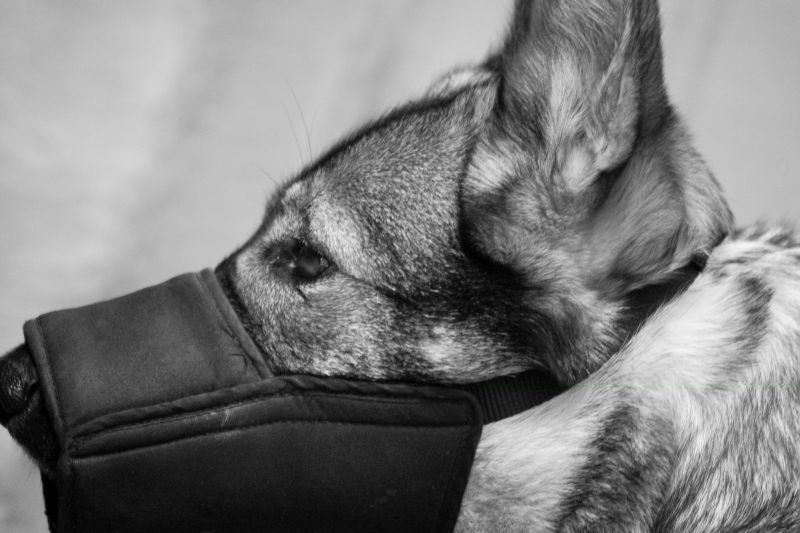
Before you run off to create your DIY muzzle, you might have a couple of questions in mind regarding muzzles and their proper use.
Can you use a muzzle to stop your dog’s barking?
Generally speaking, it is a bad idea to use a muzzle to stop your dog from barking. A properly fitting basket muzzle will allow your pup to continue barking, and tight-fitting muzzles should only be used for brief periods of time.
Understand that nuisance barking is a behavioral problem that’ll require significant effort to address. Check out our tips for addressing excessive barking to learn how to deal with these types of problems.
How do you put a muzzle on a dog?
Before attempting to put a muzzle on your dog, make sure you’re going through the proper familiarization process (see above).
To put on a muzzle, kneel down to eye level with your dog so you don’t appear as a threat. Hold out the muzzle facing your pup so that his snout is aligned with the main opening.
Place the muzzle on your dog’s snout. If your dog isn’t crazy about this idea, you may want to hold out a small treat on the other side of the opening, which should convince your pooch to put his snout in the main section of the muzzle.
Secure the straps or buckle around his neck so that you can put just one finger between the head and the strap.
Are there any muzzles that allow dogs to drink and eat?
Basket-style muzzles allow dogs to continue eating and drinking while he wears the safety device. However, keep in mind that muzzles should only be for temporary use, and they aren’t something your pup should keep on like dog collars.
How do you size a muzzle?
In general, different muzzles require different measurements, but when creating or shopping for a muzzle, you’re going to want a couple of basic measurements:
Snout Length: From the tip of your pup’s nose to about ½ inch below the eyes.
Snout Circumference: The distance around your pup’s nose, either with mouth opened or closed depending on your desired muzzle.
Height of Snout: Either the opened or closed height of the mouth.
Neck Circumference: Distance around your pet’s neck, behind the ears. This is for fitting the straps on the muzzle properly.
Do dogs mind wearing muzzles?
Just like any other piece of doggo attire, dogs must be given the proper time to acclimate to muzzles in order to accept them.
When fitted properly and introduced correctly, your pup shouldn’t mind muzzles too much, especially when used for brief periods of time.
Just make sure you introduce your dog to his muzzle as early as possible.
When should you use a muzzle?
Muzzles should be used anytime you feel your pet may have a chance of biting. A few of the most common situations in which you may want to put your dog’s muzzle on include:
– Visiting the vet (especially if your dog is scared of the vet)
– Going to the groomer
– Playing at the dog park
– Walking in crowded areas
– Anytime you are walking a dog who likes to consume street snacks
All in all, if you’re ever in doubt as to how your pet may react to something, using muzzle is a good idea.
Do vets recommend muzzles for dogs?
Vets aren’t a monolithic block, who all share the same opinion about anything.
That said, most vets do encourage owners to fit aggressive or reactive dogs with a muzzle before coming in for a visit. Some even require their use for difficult doggos.
How can I make a homemade muzzle for my dog?
There are a number of ways to make a homemade muzzle for your dog, depending on your dog’s specific needs, the materials you have available, and your skill level.
But the easiest way to make a muzzle in an emergency situation is to wrap a piece of gauze or a leash around your dog’s snout twice, and then wrap it around the back of his head, and tie it with a single knot.
How do you muzzle a dog when you don’t have a muzzle?
The best way to muzzle a dog when you don’t have a muzzle is to make an improvised muzzle from a piece of gauze, a dog leash, or something similar (such as a belt). Just be sure that you only leave it on for a brief time and monitor your dog’s breathing and body temperature.
When should you not muzzle a dog?
You never want to muzzle a dog who’s in danger of overheating or is having difficulty breathing. Additionally, it is important to avoid muzzling a dog who may vomit.
Crafting a muzzle for your pooch can be very rewarding and allow your pet to be more secure on an everyday basis. With these great DIY projects out there, there’s nothing that’s stopping you from taking that extra step towards ensuring Fido is safe and sound.
Have you made your dog’s muzzle from scratch or tried out any of these DIY projects? How did they turn out? We’d love to hear all about it in the comments below!
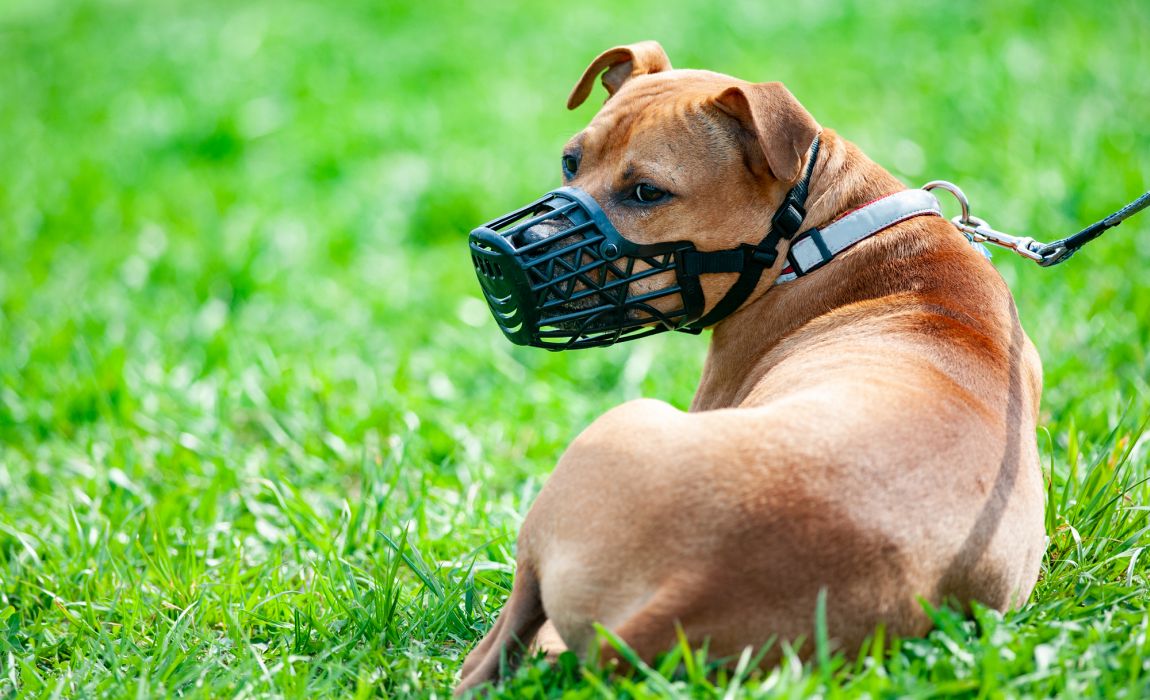

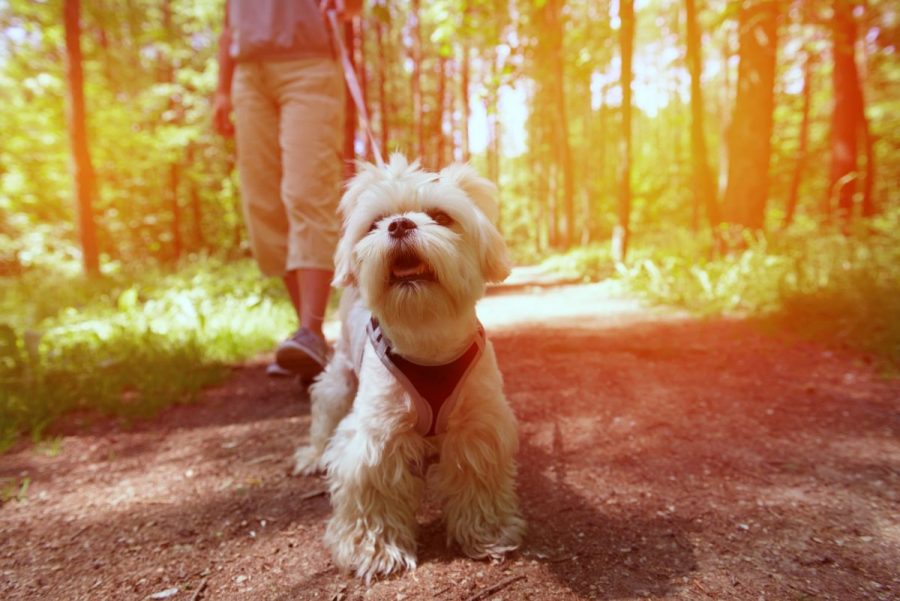


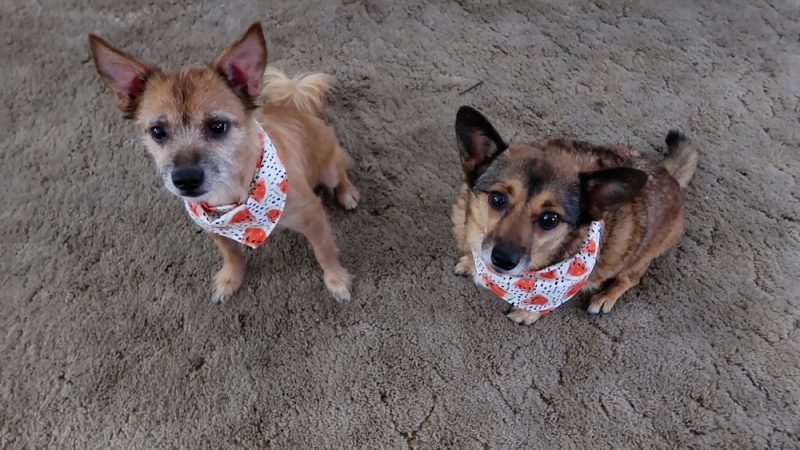




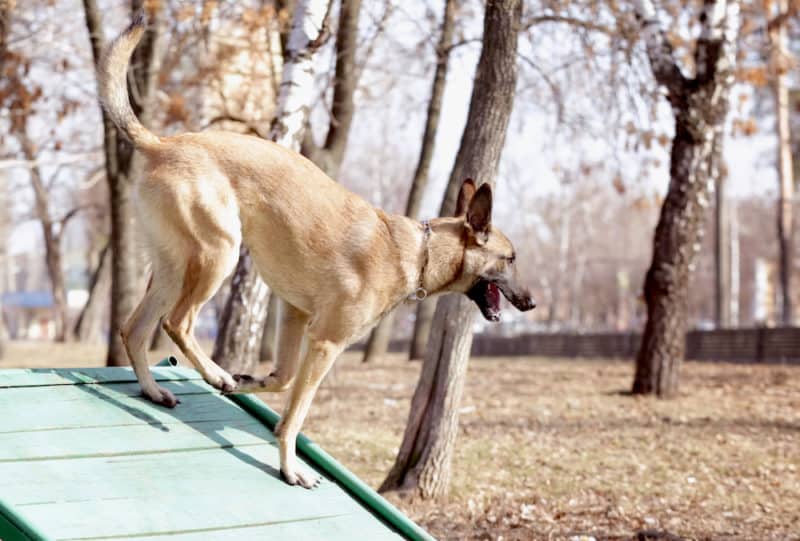

Leave a Comment